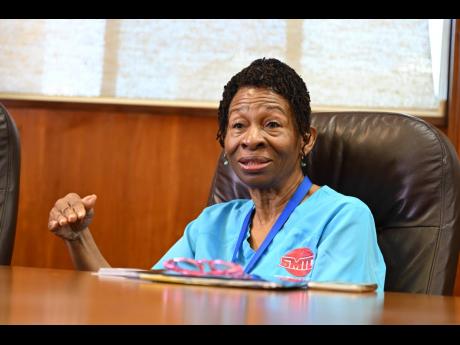JOBS GALORE!
Jamaicans missing out on thousands of practical nursing placements in UK, Canada, US
Stakeholders in the allied health service industry are urging Jamaicans to capitalise on thousands of practical nursing jobs available in Canada, the United States, and the United Kingdom – countries with large expatriate populations from the...
Stakeholders in the allied health service industry are urging Jamaicans to capitalise on thousands of practical nursing jobs available in Canada, the United States, and the United Kingdom – countries with large expatriate populations from the island.
But a lack of coordination and cooperation between entities in the industry, as well as standards deficits, is causing frustration as some trained personnel have been forced to operate in the shadows without proper academic and immigrant documentation.
Beverley Dinham Spencer, a United States-trained practitioner, who operates a local school to train practical nurses, who are also called personal support workers (PSWs) and nursing assistants (NAs), said a recent conference in Ottawa disclosed that thousands of vacancies were available in Ontario alone.
“It (the conference) was dealing with an older clientele. They were discussing the demand in Canada for health workers as one of the areas for discussion. In Ontario alone, they have over 4,000 vacancies for personal support workers or nursing assistants,” Dinham Spencer told journalists at a Gleaner Editors’ Forum Wednesday.
The deficit, she said, was much greater statewide.
Canada is seeking tens of thousands of immigrants to care for its ageing population.
“That’s only one province. You have probably about 25,000-35,000 vacancies in Canada, and right now, Canada has to be closing down nursing homes because they don’t have enough people. And they are paying well. If you want a PSW in Toronto right now, you have to be prepared to pay CDN$25 an hour. So the demand in Canada is high,” she explained.
Overseas jobs provide a fillip for the Jamaican economy, with remittance inflows to the island exceeding US$3.3 billion in 2021, representing an increase over the US$2.9 billion for 2020.
While in Canada, Dinham Spencer said that several persons approached her soliciting workers trained by her school, the SMTC Career Institute, which is accredited by that country’s nursing body.
“Several persons came to me last week and said, “Oh, my mother loves her Jamaican PSW. How can we get some more? If I took 10 PSWs with me to Canada last week, not one of them would have come back,” she told the forum.
Canada has appointed a minister in charge of senior care under a programme called Care Economy. A report out of the country suggests that 300 nursing homes were closed during the outbreak, and another 400 were projected to close by the end of 2022.
At the same time, PSWs in Canada have complained of demanding working conditions and low wages, according to a 2020 report of the situation in Windsor.
Shelley Smith, second vice-president of Unifor Local 2458, during a presentation in 2020, said in Windsor (Ontario) and the surrounding regions, long-term care homes suffered from chronic staffing challenges.
Smith, who worked as a PSW in Windsor for 33 years, told the meeting then that PSWs were passionate about their jobs but cited low wages and difficult working conditions
It is these deficits that the trainer wants Jamaica to tap into in Canada, the United States, and United Kingdom.
“In the US, in Florida alone, the vacancy rate is about 5,000-6,000. What I am saying, and I have been preaching this for the last five years, that the Philippines, they are training people for export. They don’t care. They have the schools, the government has the systems, and they are pumping out those people, and the return is phenomenal,” Dinham Spencer told the forum.
“It is creating, millions, billions of dollars for the economy. I am just saying, I want Jamaica to be another Philippines because we are nicer. We are alive and we make the patients in the nursing homes feel alive. We cook rice and peas for the patients. We Jamaicanise them,” she said.
UK vacancies have been reduced to about 25,000, down from 40,000, she also said.

